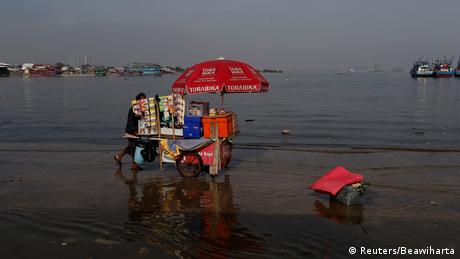The Asia-Pacific conference of German business will be held this year in Jakarta. In the run-up to the DW spoke to Jan Rönnfeld of the chamber of Commerce in Indonesia about the Situation there.

The largest networking conference in the Asia-Pacific Region will take place from 1. to 3. November in the Indonesian capital, Jakarta, instead. 16. Asia-Pacific conference (APK) of German business to be expected to host over 900 guests, including Federal Minister for economic Affairs, Peter Altmaier, and top managers of large companies such as Siemens, Bosch and Daimler. But also many medium-sized companies and around half of the participants coming from the Region.
Indonesia is one of the 20 largest economies in the world. With 260 million inhabitants it is the largest country with a majority Muslim population. In the run-up to the conference, DW spoke to Jan Rönnfeld, has co-organized as a managing Director of the German-Indonesian chamber of Commerce abroad (AHK) in the conference.
Deutsche Welle: How do you estimate the economic Situation in Indonesia at the moment?
Jan Rönnfeld: Relatively positive, the country is very stable. Among the G20 countries, it is one of the countries with the most stable growth in the five to six percent. The driving force, especially the growing middle class. Approximately 60 percent of the growth will be generated by local consumption, which contributes to the stability.
But Indonesia is affected, like other emerging countries, of a flight of capital. Investors are currently oriented more away from the threshold countries. What are the implications?
The first impact is of course the Currency depreciation, Indonesia is affected. In addition to India, it is the most affected Asian state. The second effect relates to the imports, because Indonesia has to import most of its Oil and petroleum products. A poor exchange rate, coupled with high Oil prices, has consequences that can be felt in the government.
But this also means that the population feels it, too?
Yes, of course, about the rising gasoline prices. And there is an inflationary effect that is felt also in the case of other imported goods. Conversely, the increase in the prices of raw materials also has a positive effect, because Indonesia exported also raw materials [including coal and Gas – Anm. d. Red.] and thus deserves more money. In General, the Currency depreciation, however, is the more dominant effect.
Watch the Video 02:35 live Now 02:35 Min. 
Jakarta – the Hunger between high-rise buildings
Send Facebook Twitter google+ Tumblr VZ Mr. Wong Xing Newsvine Digg
Permalink https://p.dw.com/p/2sil8
Jakarta – the Hunger between high-rise buildings
There are fears that the Asian crisis of 1997-98 could repeat? At the time, Indonesia’s currency lost 75 percent of their value, many companies went bankrupt.
Many Indonesians who are now in senior positions, have experienced this crisis at the time. Insofar, this is a fear that is in the room. I believe, however, that the Situation today is more stable than in 1998.
Indonesia now has significantly more foreign reserves, between 115 and 120 billion dollars. If you calculate, how many months a country would be able to Finance its foreign trade, then Indonesia is well above the threshold of three months. Also the foreign debt is limited, and the national debt is only around 30 percent of economic output. Since Indonesia is in a really convenient location.
Despite this stability there is in the markets of certain Irrationalities in relation to the emerging countries. How do you see that?
If you compare Indonesia with his Peer Group – i.e. with countries which have similar development levels – then wouldn’t the surrounding countries, but rather Brazil, South Africa, Turkey or Russia. If you look at what these countries had in recent years for problems, then Indonesia is a relatively relaxed country.
What are you hoping for from the Asia-Pacific conference in Jakarta?
Indonesia was selected to draw attention to this country. On the priority scale of the German companies, the country is not yet where it does because of its capabilities and size. Therefore, the decision was made for Jakarta.
Generally speaking, the conference is not a bilateral, but an Asian conference, and it is also global topics will be discussed. We expect this to have an exchange with the fast-growing Region Asia – to see which countries are still focused on free and rule-based trade, and not so strong protectionist tendencies.
Jan Rönnfeld for nearly 14 years, managing Director of the chamber of Commerce abroad (AHK) in Indonesia. Previously, the studied economist, has an MBA and a Bachelor’s degree in cultural Sciences was, for the German chamber of Commerce in New York. His main subjects are Marketing, strategic planning, and project management.
The Interview was conducted by Manuela Kasper-Claridge.











